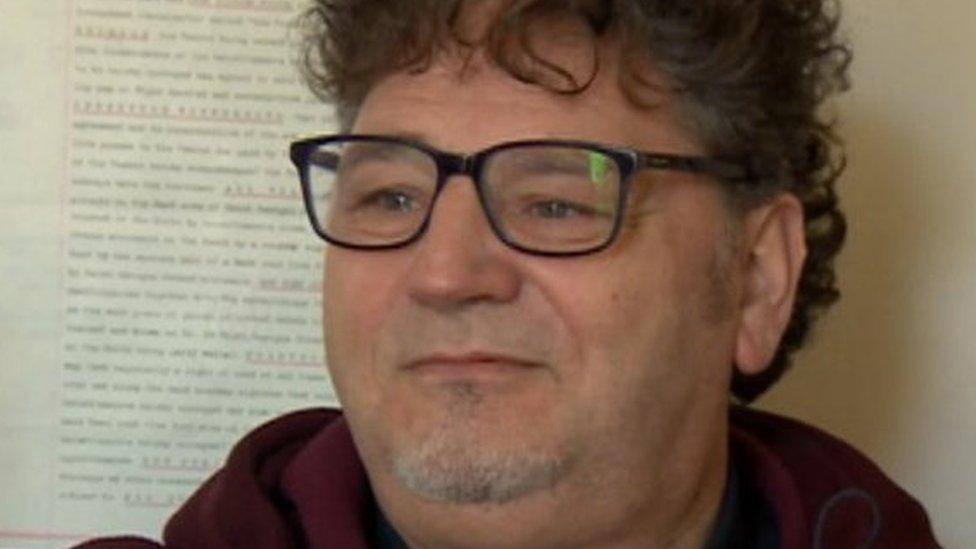The Ukrainian language classes helping Britons talk to refugees
- Published
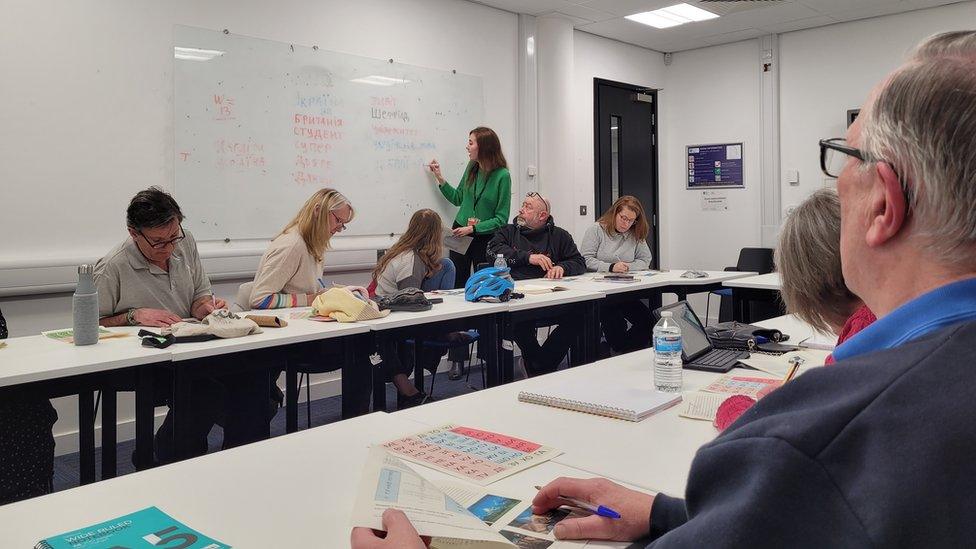
Robert McWhirter, right, and Clive Belgeonne, left, are among the students being taught Ukrainian by visiting academic Nataliia Faryna in Sheffield
More than 167,000 Ukrainian refugees have fled to the UK since war broke out, with many housed by British families who do not speak their native tongue. The University of Sheffield has launched a new language course aimed at helping hosts communicate with their guests. The BBC went along to a lesson.
At the start of last year 74-year-old Robert McWhirter had never considered learning Ukrainian.
But now, in a Sheffield classroom on a Tuesday evening in March, he is one of 17 students who are tentatively greeting each other "dobryi den".
They have all enrolled on a new Ukrainian language course launched by the University of Sheffield in the wake of the Russian invasion.
The weekly beginners' evening classes - which are taught by visiting Ukrainian academics - are aimed, in part, at people hosting some of the 167,600 refugees who have arrived in the UK since February 2022.
Mr McWhirter is currently hosting his second refugee at his Gleadless home. He signed up for the course to help him communicate better with her, a refugee from Dnipro.
"My first guest had very little English so I was using Google Translate a lot. It's not ideal," says the retired IT worker, who also volunteers at a Ukraine refugee support centre at St Mary's Church in Bramall Lane.
"I want to understand a bit more about what they are saying and perhaps be able to converse with them in their own language to some extent," he adds.
"It's very difficult for them coming to a strange country from a war zone."

The course is being taught by visiting academics from the Ukrainian city of Lviv
Clive Belgeonne, 64, who is taking the course with his partner Nickey Brown, 58, says learning Ukrainian "wasn't something we'd envisaged" before the war.
That changed when they took a Ukrainian mother and her two young children into their Nether Edge home in May last year.
The family are among the 622 people who have arrived in Sheffield under the Homes for Ukraine scheme.
The British couple tried using language-learning app Duolingo to pick up some Ukrainian but made little progress and were soon overtaken by their young guests' rapidly-improving English skills.
Mr Belgeonne says the university's course is "a good opportunity to push us further into making the effort".
"And we like a challenge," adds the keen linguist who already speaks French, Spanish, Portuguese and the West African language Mandinka.
'A way to say thank you'
The lessons are being taught by Nataliia Faryna, an associate professor of applied linguistics at the Ivan Franko National University of Lviv.
The city in the west of the country has not been hit as hard by fighting as some other parts of Ukraine. A number of the university's buildings have been used as a shelter for people who fled conflict zones.
While classes were paused when war broke out, Ivan Franko has since resumed teaching with air raid shelters installed in all educational buildings and dormitories as well as generators to guard against blackouts.
Ms Faryna, who is staying in Sheffield to teach the course for six months, says her classes are "a way to tell people about Ukraine, about our culture and worldview".
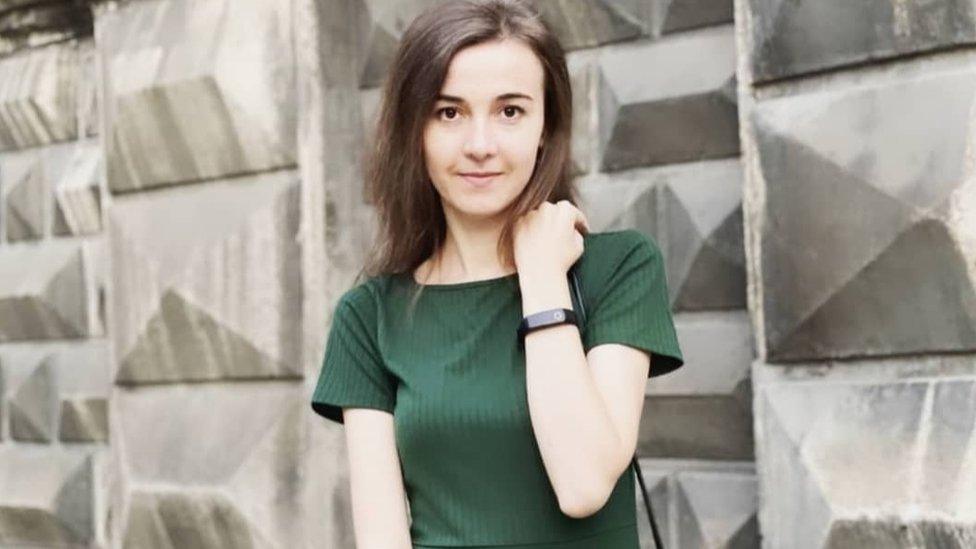
Nataliia Faryna says teaching Britons the Ukrainian language is a way to say thank you
Speaking as students grapple with the Cyrillic alphabet, she admits getting to grips with Ukrainian can be "a little difficult". But adds: "If you have the motivation, you will learn this language."
While she is not a refugee herself, she feels she is giving something back for the support the UK has shown to her country.
"I'm very grateful for the people of the UK for standing in this war, so it's way to say thank you," she tells me.
'Bringing people together'
While several of the students taking the class are hosting refugees, others have have different motivations for being here.
"For me it's quite a personal reason," says Amy Huxtable, 36, of Hillsborough, who is also studying the course. "My grandpa was Ukrainian - he came over to the UK after the second world war. I always felt a little bit guilty, I guess, that I didn't learn his language.
"When you're younger, you don't necessarily appreciate how important it can be to even learn a few words in a different language."
The university has also launched a new language conversion course, which it says is the first of its kind in the UK, for students who already speak Russian or other Slavonic languages and want to learn Ukrainian at a faster pace.
Dr Laurent Semichon, director of the university's Modern Languages Teaching Centre, says he hopes the classes will "bring people together".
"This initiative is not just about language, it is also about creating a space where participants can share their experience and learn more about Ukrainian culture," he adds.

Follow BBC Yorkshire on Facebook, external, Twitter, external and Instagram, external. Send your story ideas to yorkslincs.news@bbc.co.uk, external.
- Published24 February 2023
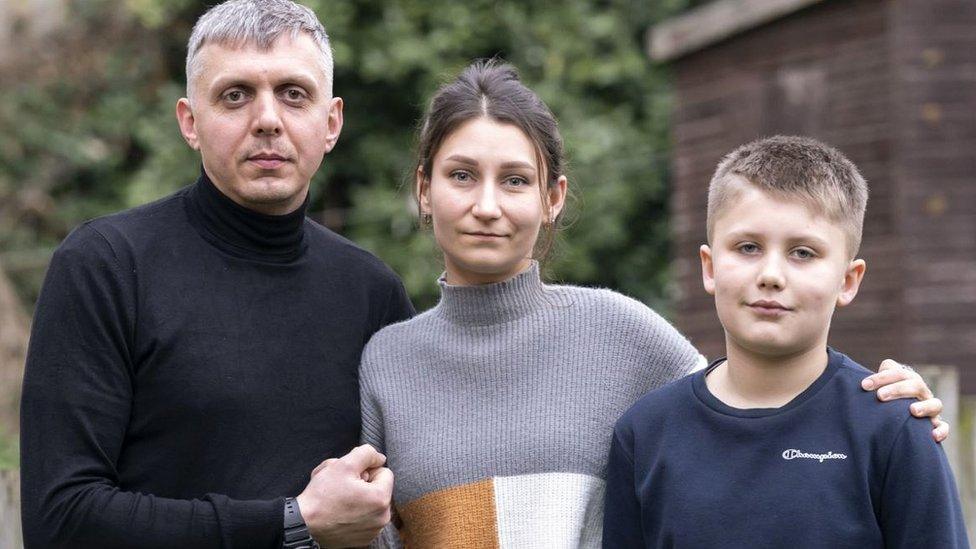
- Published7 September 2022
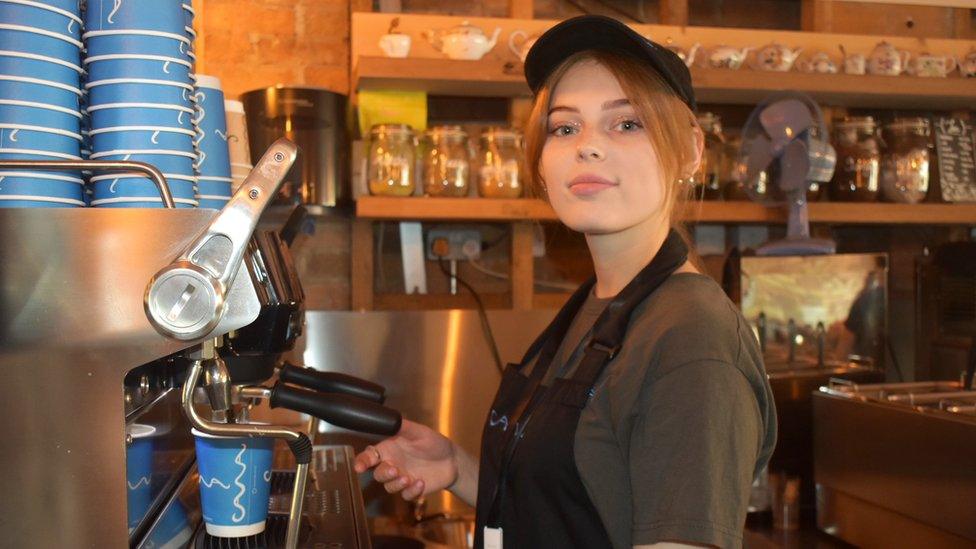
- Published14 March 2022
